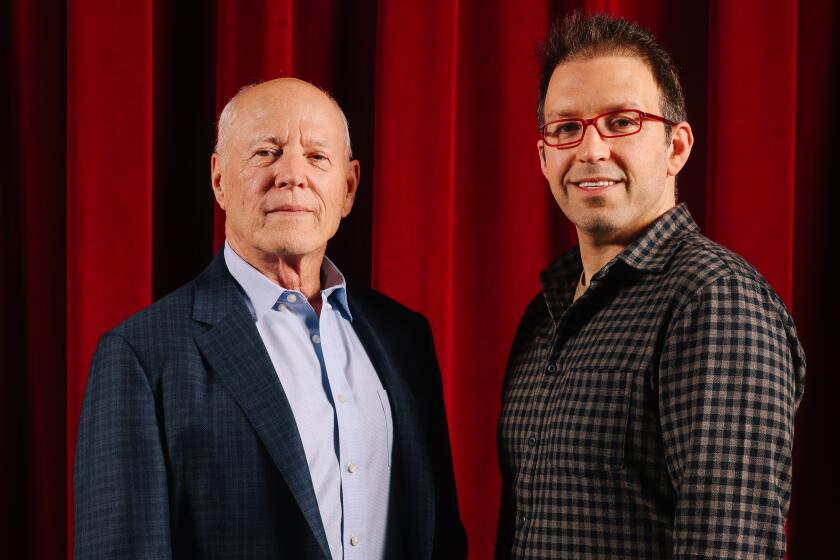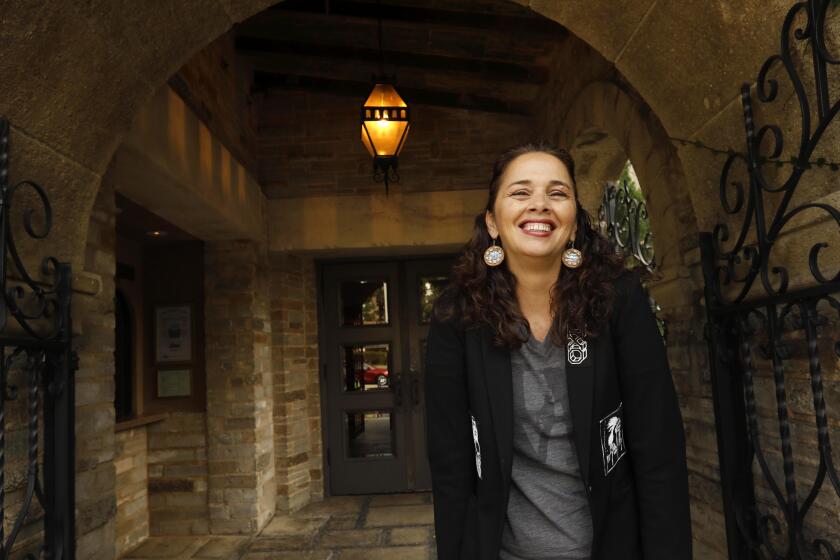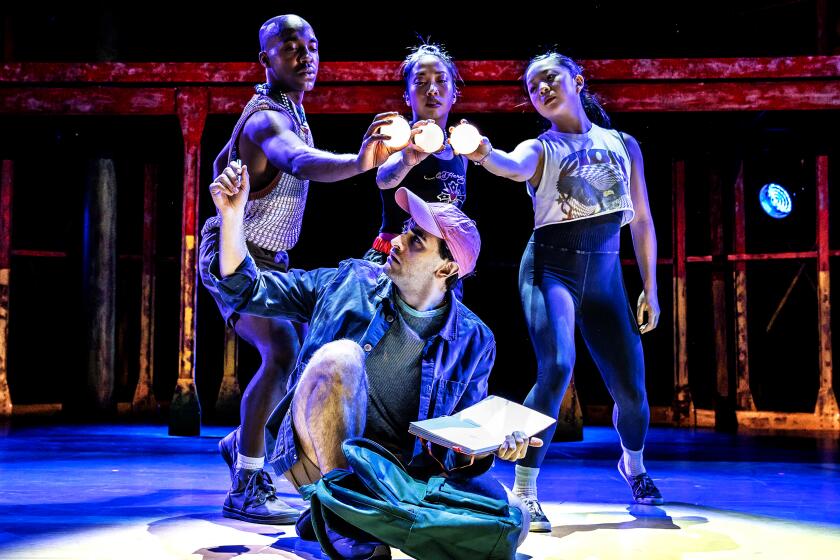The Sunday Conversation: Jason Alexander
Even before Jason Alexander, 51, became a household name playing George Costanza on “Seinfeld” in the ‘90s, he was an accomplished song-and-dance man in New York, scoring a 1989 Tony for best actor in a musical for “ Jerome Robbins’ Broadway.” An occasional stage presence in Los Angeles, Reprise Theatre Company’s artistic director stars in its revival of “They’re Playing Our Song” at UCLA’s Freud Playhouse from Sept. 28 through Oct. 10.
You’ve been artistic director of Reprise for more than three years, but you rarely perform with the company. How do you choose what you perform in, and why did you choose “They’re Playing Our Song”?
I try to not have Reprise become a vanity house, so I’m very careful about when I’m onstage or when I’m directing, because any time I do it, it limits the opportunity for somebody else. Reprise has an interesting sort of alchemy to create a season. We try to do something that’s a little more modern, something that’s quite old, something that has a lot of dance. At the same time, we have very limited production budgets, so we have to do a big show, a small show, a medium show. “They’re Playing Our Song” is a relatively small show, which is unusual — there aren’t a lot of small musicals. There are eight characters, and it can be done with a relatively small orchestra, but it relies heavily on the two leads. Since this show is essentially two people, you need at least one of them to have some real star power. And the trouble with Reprise is that you only have six days in the rehearsal studio to get the show staged and under your belt. That is horrifying for most actors. I did not believe that we would find an actor of note to take that on, and that’s why I took it.
Why did you add songs to this production?
“They’re Playing Our Song” was created very quickly the first time around. Marvin [Hamlisch] and Carole [Bayer Sager] had been working on a musical version of Neil Simon’s “The Gingerbread Lady,” and they were having their relationship squabbles and Neil thought they were adorable and said, “Let’s do this [show based on their relationship].” It moved from concept to production very, very fast. I’ve heard the term six weeks thrown around. The result is, for me, there aren’t a lot of songs in the show. The average two-act Broadway musical has 12 to 14 songs, and then there can be encores and reprises as well. “Playing Our Song” only had eight original songs and several reprises. It’s really a play with music as opposed to a fully fleshed-out musical. So I thought, “Wouldn’t it be great if Neil and Marvin and Carole were open to fleshing out that score a little more to make it a fuller-feeling musical?” They all seemed willing to give it a shot.
People are always taking the temperature of musical theater. So how’s it doing?
It depends on where you are. Certainly in New York, you can’t find a play on Broadway right now — they’re all musicals. L.A. is a very strange town for theater in general, but the things that do make big splashes here are certain musicals. They tend to be spectacular event musicals — “Lion King,” “The Producers,” “ Wicked.” There’s a definite audience for it, and Reprise has had that audience as our subscriber base going on 15 years now. But the truth is, doing theater in L.A. is just hard. The problem is in theater, like every other medium in our business right now, the business models are all straining at the seams. And producing a musical is a very expensive proposition, and the only way anyone knows to compensate for it right now is to keep raising the ticket prices. Certainly in New York, but we have to be careful of it here too, you can price yourself right out of your audience. The average person cannot spend $100 a ticket to go see a musical for an evening, and when you add travel and parking and food, you’re almost at $150, $200 per person. That’s untenable. All of us have to come up with a new way of doing these things where they can be done with integrity and artistry, but we’re not making our audience elitist.
What do you think is strange about the L.A. theater scene?
What’s strange about it is there are so many people here in the arts — so many actors, writers and directors and people who oversee the business end of making what they hope will be an artistic product. But it’s extremely hard to get and sustain an audience of theatergoers here. The thing I cannot fathom here is that on any given day, there’s more theater happening in Los Angeles than there is in New York. There are more of these little 99-seat waiver theaters; there must be 250 little shows happening this weekend, and that eclipses New York. But none of them are getting any kind of real solid, reliable support. Certainly Center Theatre Group and the Geffen do consistently well; despite its financial troubles the Pasadena Playhouse — as far as audience attendance — does consistently well. But it’s very, very hard for all the other little theater companies, no matter how interesting the product is they’re putting out there. I don’t know what the answer is, other than the theater is an expensive proposition, and when it disappoints, it disappoints big.
I have to ask you the requisite “Seinfeld” question: Are you in touch with any of the other cast members?
Sure. Jerry [Seinfeld] and Michael [Richards] are in New York, so we don’t catch up that often. Julia’s out here. Julia [Louis-Dreyfus] and I chatted at an event three weeks ago. Our oldest sons both went off to college this week, so we were commiserating. I even approached Julia about doing “They’re Playing Our Song” with me. She has a gorgeous voice, but she also has a phobia about singing live in front of an audience. She said, “Can we record it?” I said, “You can’t record in the theater.” I haven’t been able to pull her into the right piece, and I think if I keep throwing musicals at her, she’s always going to shy away.
calendar@latimes.com
More to Read
The biggest entertainment stories
Get our big stories about Hollywood, film, television, music, arts, culture and more right in your inbox as soon as they publish.
You may occasionally receive promotional content from the Los Angeles Times.





